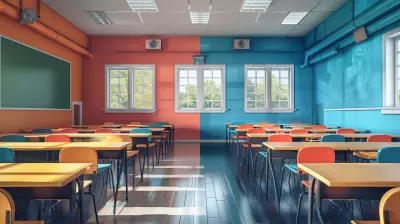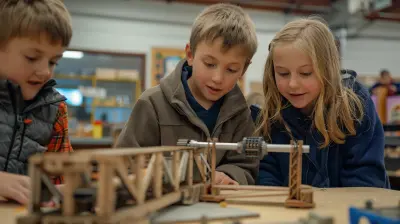How to Foster Critical Thinking Skills in Young Learners
3 January 2025
In today’s rapidly evolving world, critical thinking is more important than ever before. It’s not just about memorizing facts or regurgitating information. Young learners need to be able to analyze, evaluate, and make decisions based on evidence and reasoning. But how exactly do you help children develop these essential skills? Don’t worry, I’ve got you covered!
In this article, I’ll walk you through some proven strategies for fostering critical thinking in young learners. Whether you're a parent, teacher, or mentor, these tips will guide you in nurturing inquisitive minds and empowering kids to think for themselves - and think deeply.
Let’s dive in!

What is Critical Thinking?
Before we get into the nitty-gritty, let’s take a moment to define what critical thinking actually is. At its core, critical thinking involves the ability to think clearly and rationally, understanding the logical connection between ideas. It’s about questioning assumptions, analyzing different viewpoints, and making well-reasoned judgments.Think of critical thinking as a mental workout for your brain. Just as exercising your body helps build strong muscles, practicing critical thinking helps build a sharp, agile mind.
Why is Critical Thinking Important?
You might be wondering, “Why should we even bother teaching kids critical thinking?” Well, it’s simple. Critical thinking equips young learners with the tools they need to navigate life’s challenges. It helps them:- Solve problems effectively – Instead of jumping to conclusions, they evaluate options and weigh the pros and cons.
- Make better decisions – From choosing friends to picking career paths, critical thinking helps kids make informed choices.
- Become independent learners – They learn to ask the right questions and seek out answers on their own.
- Understand different perspectives – Critical thinking encourages empathy and appreciation for diverse viewpoints.
In short, critical thinking is crucial for both academic success and personal growth.

Key Strategies to Foster Critical Thinking in Young Learners
Now that we’ve defined critical thinking and its importance, let’s look at some practical strategies to promote this skill in young learners.1. Encourage Curiosity and Asking Questions
Remember the age-old adage, “There’s no such thing as a stupid question”? Well, it’s true! Encouraging kids to ask questions is one of the best ways to nurture their critical thinking skills. When children are curious, they naturally want to explore, discover, and understand the world around them.Don’t just give them answers right away. Instead, respond with open-ended questions like, “What do you think?” or “How would you solve this problem?” This helps them reflect and come up with solutions on their own.
Example:
If a child asks, “Why is the sky blue?” Instead of giving a simple scientific explanation, ask them, “What do you think causes the sky to look blue? Let’s explore it together!” This way, they engage in critical thinking and investigation.2. Promote Problem-Solving Activities
Problem-solving is a fantastic way to get those critical thinking gears turning. Whether it’s a puzzle, a riddle, or a real-life challenge, encouraging young learners to work through problems helps them develop logical reasoning and creative thinking.Give them age-appropriate problems to tackle and allow them to brainstorm solutions. Even if they don’t get it right the first time, the process of working through a problem is what matters most.
Example:
You can set up a fun activity where kids have to build a bridge using household items like straws, paper, and tape. Ask them to figure out which materials would make the bridge the strongest. This hands-on approach fosters both creativity and critical thinking.3. Encourage Reflection and Self-Assessment
Reflection is a key component of critical thinking. After completing a task or solving a problem, encourage young learners to reflect on what they did and how they could improve.Ask them questions like:
- “What do you think went well?”
- “What would you do differently next time?”
- “Why do you think this solution worked?”
This type of reflection helps children analyze their own thinking processes and become more aware of how they approach problems.
4. Teach Them to Evaluate Information
In today’s digital age, children are constantly bombarded with information. One of the most valuable critical thinking skills they can develop is the ability to evaluate the credibility of information.Teach them to ask questions like:
- “Where did this information come from?”
- “Is this source trustworthy?”
- “Are there different perspectives on this topic?”
This helps them become discerning consumers of information and avoid falling for misinformation or biased views.
Example:
If they come across a news article online, ask them to evaluate its sources. Is it from a reputable website? Are the claims backed by evidence? This will teach them to not accept information at face value but to investigate further.5. Foster a Growth Mindset
A growth mindset is the belief that abilities can be developed through dedication and hard work. When children understand that they can improve their skills, including critical thinking, they are more likely to embrace challenges and persist in the face of setbacks.Encourage young learners to view mistakes as learning opportunities rather than failures. Praise their effort and perseverance, not just the outcome. This builds resilience, which is crucial for critical thinking.
Example:
If a student struggles with a math problem, instead of saying, “You’re not good at math,” say, “You haven’t mastered this yet, but with practice, you’ll get there!” This encourages them to keep trying, knowing that they have the ability to improve.6. Promote Debate and Discussion
Debating and discussing different viewpoints is an excellent way to foster critical thinking. Engage children in friendly debates on various topics and encourage them to back up their arguments with facts and reasoning.This not only helps them develop their argumentative skills but also teaches them to listen to and consider opposing viewpoints. It’s a great way to practice thinking critically about different perspectives.
Example:
Host a family debate night where everyone picks a topic, such as “Should school uniforms be required?” Encourage kids to present their arguments and challenge them to think critically about their position.7. Use Books and Stories to Stimulate Thinking
Reading books and stories is a fantastic way to stimulate critical thinking. When children read, they’re exposed to different characters, situations, and moral dilemmas. Ask them to think about the motivations of the characters, the consequences of their actions, and how they might have acted differently.Example:
After reading a story, ask questions like, “Why do you think the character made that choice?” or “What would you have done in that situation?” This encourages them to think deeply about the story and its themes.8. Let Them Play!
Believe it or not, playtime is an essential part of developing critical thinking. Unstructured play allows children to use their imagination, experiment with different possibilities, and solve problems on their own.Whether it’s building with blocks, playing pretend, or engaging in a role-playing game, play stimulates cognitive development and enhances critical thinking skills. So, don't underestimate the power of play!

The Role of Teachers and Parents in Developing Critical Thinking
As parents, teachers, and mentors, we play a crucial role in shaping young learners’ critical thinking abilities. But here’s the kicker: it’s not just about giving kids the answers or telling them what to think. It’s about creating an environment where they feel safe to explore, make mistakes, and learn from them.Here are a few tips for fostering an environment that promotes critical thinking:
- Be a role model – Demonstrate critical thinking in your own life. Show them how you weigh decisions, evaluate information, and solve problems.
- Create a safe space for inquiry – Encourage kids to ask questions and express their thoughts without fear of judgment.
- Provide opportunities for hands-on learning – Whether it’s science experiments, art projects, or real-world problem-solving, give kids the chance to engage in experiential learning.
- Be patient – Developing critical thinking takes time. Don’t rush the process. Encourage perseverance and curiosity.

Conclusion
Fostering critical thinking skills in young learners is one of the most valuable gifts you can give them. It empowers them to navigate the complexities of life, make informed decisions, and approach challenges with confidence and creativity. Whether it’s through asking questions, solving problems, or engaging in discussions, there are countless ways to nurture this essential skill.So, the next time your child or student asks, “Why?” don’t just give them the answer—guide them to find it themselves. After all, critical thinking isn’t just about what they learn; it’s about how they learn.
all images in this post were generated using AI tools
Category:
Critical ThinkingAuthor:

Madeleine Newton
Discussion
rate this article
18 comments
Lara Harris
Critical thinking in kids? It's like teaching them to use a magic wand that transforms 'Why?' into 'Let me explore!' Just remember, even wands need a little battery life!
March 30, 2025 at 7:03 PM

Madeleine Newton
Absolutely! Encouraging curiosity and exploration is essential for critical thinking. Just like a magic wand, it thrives on engagement and inspiration—let’s keep that battery charged!
Rowan Reese
Thank you for this insightful article! Fostering critical thinking in young learners is vital for their development. Your practical tips offer a great foundation for educators and parents to encourage curiosity and independent thinking in children.
February 2, 2025 at 3:26 AM

Madeleine Newton
Thank you for your kind words! I'm glad you found the tips helpful for fostering curiosity and critical thinking in young learners.
Sophie Smith
Great article! Encouraging curiosity and asking open-ended questions can truly spark critical thinking in kids. It's amazing to see how they develop their own ideas and solutions when given the chance!
January 30, 2025 at 5:15 AM

Madeleine Newton
Thank you! I'm glad you found the article helpful. Encouraging curiosity is indeed key to nurturing critical thinking in children!
Kismet Romero
Thank you for this insightful article! Fostering critical thinking in young learners is essential for their growth and future success. Your practical tips inspire educators and parents to nurture curiosity and creativity, empowering children to become thoughtful, independent thinkers.
January 25, 2025 at 7:16 PM

Madeleine Newton
Thank you for your kind words! I'm glad the article resonated with you and that you found the tips helpful for encouraging critical thinking in young learners.
Alvin Wilson
Empowering young minds to think critically is essential for their growth! By nurturing curiosity and encouraging questions, we help them become independent thinkers. Remember, every question they ask is a step toward deeper understanding. Let’s inspire the next generation to think boldly and creatively!
January 20, 2025 at 7:41 PM

Madeleine Newton
Absolutely! Encouraging curiosity and questions is key to developing independent thinkers. Let's continue to inspire creativity and bold thinking in our young learners!
Yvonne Black
Empowering young learners with critical thinking skills is the key to unlocking their potential! By encouraging curiosity, asking open-ended questions, and fostering a safe environment for dialogue, we can inspire them to explore, analyze, and think independently. Together, let's nurture the thinkers of tomorrow! 🌟
January 15, 2025 at 5:44 AM

Madeleine Newton
Absolutely! Fostering critical thinking in young learners is essential for their growth. Encouraging curiosity and open dialogue will equip them with the tools to become independent thinkers. Let's inspire the next generation! 🌟
Veda Morales
Critical thinking in kids: because ‘Why?’ is the new ‘Because I said so!’
January 11, 2025 at 2:00 PM

Madeleine Newton
Absolutely! Encouraging kids to ask "Why?" promotes curiosity and deeper understanding, essential for developing critical thinking skills.
Amira Bowman
Great insights! Encouraging questioning and open discussions are key. Providing real-life scenarios can also stimulate critical thinking in young learners effectively. Keep inspiring!
January 10, 2025 at 7:19 PM

Madeleine Newton
Thank you for your kind words! I completely agree—real-life scenarios truly enrich the learning experience and enhance critical thinking.
Rayna Reilly
This article sparks my curiosity! How can we integrate everyday experiences into fostering critical thinking? I'm eager to explore practical activities that both engage young learners and challenge their thought processes. Insights would be appreciated!
January 10, 2025 at 12:38 PM

Madeleine Newton
Thank you for your enthusiasm! Integrating everyday experiences can be done through activities like role-playing, problem-solving games, and discussions around current events. Encourage learners to ask questions, make predictions, and reflect on their choices to deepen their critical thinking skills.
Harmony Kim
Empowering young learners through questioning and exploration enhances their critical thinking skills effectively.
January 9, 2025 at 1:12 PM

Madeleine Newton
Thank you for your insightful comment! Questioning and exploration are indeed key strategies for developing critical thinking in young learners.
Elowis Warner
How can we measure progress?
January 9, 2025 at 5:38 AM

Madeleine Newton
Progress can be measured through assessments, reflective journals, and student-led discussions that demonstrate their ability to analyze, evaluate, and synthesize information.
Thistle Curry
Great insights! Encouraging curiosity and open dialogue truly nurtures young learners’ critical thinking skills.
January 8, 2025 at 9:34 PM

Madeleine Newton
Thank you! I'm glad you found the insights valuable. Encouraging curiosity is indeed essential for developing critical thinking in young learners.
Noemi Chavez
In the garden of young minds, let questions bloom, Nurture curiosity, dispel the gloom. With gentle guidance, watch thoughts take flight, Fostering critical thinking, a beacon of light. Empower their voices, ignite insight.
January 7, 2025 at 4:51 AM

Madeleine Newton
Thank you for your beautiful words! You perfectly capture the essence of nurturing curiosity and critical thinking in young minds.
Wolf Coleman
Thank you for sharing these valuable insights! Encouraging critical thinking from a young age is essential for nurturing inquisitive minds and promoting lifelong learning. Great read!
January 5, 2025 at 11:51 AM

Madeleine Newton
Thank you for your thoughtful comment! I'm glad you found the insights valuable. Encouraging critical thinking is indeed key to fostering a love of learning.
Owen McAdams
This article offers valuable insights on nurturing critical thinking in young learners. By incorporating active questioning and problem-solving activities, educators can effectively engage students and promote deeper understanding, essential for their future academic and life success.
January 4, 2025 at 9:42 PM

Madeleine Newton
Thank you for your thoughtful comment! I’m glad you found the insights on active questioning and problem-solving helpful for nurturing critical thinking in young learners.
Etta McConkey
Great tips! Encourage open discussions to enhance critical thinking in young learners.
January 4, 2025 at 1:41 PM

Madeleine Newton
Thank you! Open discussions are indeed crucial for nurturing critical thinking in young learners.
Foster Hardy
Fostering critical thinking in young learners requires intentional strategies, such as encouraging questioning, promoting collaborative discussions, and integrating problem-based learning. By creating a safe and stimulating environment, educators can empower students to analyze, evaluate, and innovate effectively, enhancing lifelong learning.
January 3, 2025 at 12:46 PM

Madeleine Newton
Thank you for your insightful comment! I completely agree—intentional strategies like questioning and collaborative discussions are key to fostering critical thinking in young learners. Creating a supportive environment is essential for empowering students to thrive in their analytical skills.
Noah Kline
This article offers valuable insights into nurturing critical thinking in young learners. The suggested strategies are practical and engaging, fostering a deeper understanding and encouraging curiosity. Thank you for sharing these essential tips!
January 3, 2025 at 5:29 AM

Madeleine Newton
Thank you for your kind words! I'm glad you found the strategies useful for nurturing critical thinking in young learners.
MORE POSTS

Charter Schools vs. Public Schools: A Funding Perspective

How to Teach Math as a Creative Process

How to Build a Professional Network While Still in College

Developing Self-Regulation Skills in Toddlers and Preschoolers

How to Fast-Track Your Language Learning with Mindfulness Practices

STEM Challenges for Sparking Curiosity in the Classroom

Promoting Mindfulness in Schools: A Guide for Educators

Media Literacy and the Future of Journalism

How to Handle Distractions and Stay on Task While Studying

The Role of Virtual Reality in Distance Learning

Promoting Positive Mental Health Through Extracurricular Activities